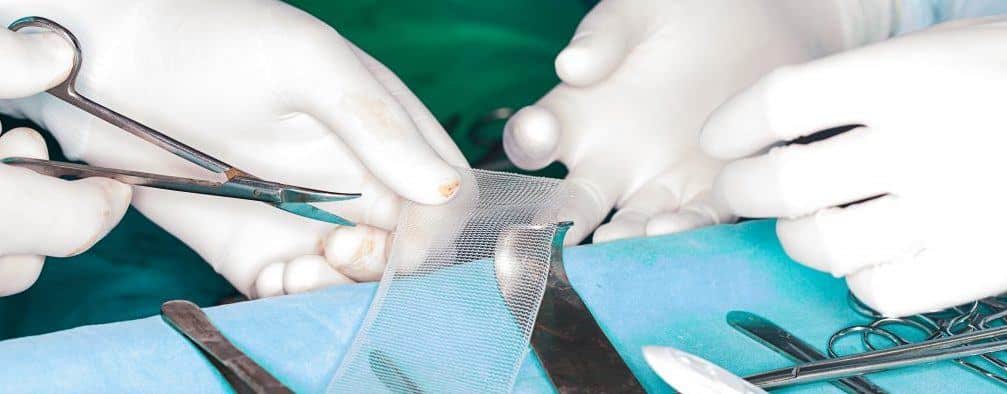
Hernia mesh is a sterile woven fabric that may be used in hernia surgeries in addition to stitches to reinforce and strengthen the weakened tissue thereby lessening the chance of recurrence. This medical device is generally constructed from animal tissue or synthetic materials and has been in use since the 1950s.
Hernia Mesh Complications
The FDA warns patients of serious complications that have been reported concerning hernia mesh. Serious complications may include:
- recurrence of the hernia
- infections
- serious pain
- rejection
- internal bleeding
- tissue erosion
- adhesion
- bowel obstruction.
Esophageal damage can also result, which may cause permanent digestive system impairment. Some of these complications can be life-threatening or may result in permanent disability. Treatments for such complications may require antibiotics, additional surgery, or blood transfusions.
Physiomesh™ is a hernia mesh product manufactured by Ethicon, a Johnson & Johnson subsidiary. In a letter to healthcare providers dated May 24, Ethicon said that they were recalling their product following their review of unpublished data from two large European hernia registries. The letter claimed that the data revealed that hernia recurrence and reoperation rates following minimally invasive laparoscopic ventral hernia surgeries were higher than average when using the Ethicon product. The company has not been able to be more specific about the reasons behind these discrepancies, nor have they been able to provide surgeons with any further instructions that might lead to a reduction in the recurrence rate.
C-Qur™ is another hernia mesh product manufactured by medical device company Atrium. In August of 2013, the FDA announced a Class ll recall of the product after numerous reports of rejections, oozing adhesions, chronic infection and nerve damage.
Hughes & Coleman represents victims of hernia mesh failure throughout Kentucky and Tennessee. If you had a hernia mesh implanted and have suffered from complications, we want to help. Our team is looking into cases on behalf of all patients that have a hernia mesh implant, no matter the brand.
If you are interested in signing onto our tort against these manufacturers, we will need to know the date of your implant surgery, the hospital where you had the procedure done, and the name of the doctor who performed the procedure. If you don’t know this information we can help you look it up. In addition, please have available any medical records you may possess. The more records you can provide, the better we will be able to help. Call our law offices and let us know that you are interested in our tort case. We will provide you with an intake questionnaire and next steps.
Even if you are not eligible to sign on for our tort case, you may still have a case for medical malpractice. If you have received hernia mesh and have experienced complications following the procedure, you may be able to collect compensation for your injuries with the help of our attorneys.
Obtaining medical records regarding your case should provide important information regarding the mesh used. This can help us determine if there are any FDA warnings regarding the product. Following this, you will need to be diagnosed with an injury, infection or other physical condition which can be shown to be related to the defective mesh.
Seek Help from Medical Malpractice Attorneys
If you have suffered an injury or a severe health condition related to the use of hernia mesh, don’t hesitate to contact us for help. The medical malpractice lawyers at Hughes & Coleman are experienced in handling these kinds of cases, and we’ll be happy to provide you with a free case consultation. There is no fee for our services unless we win your case. Give us a call today at 800-800-4600.
Cases likely to be referred.


